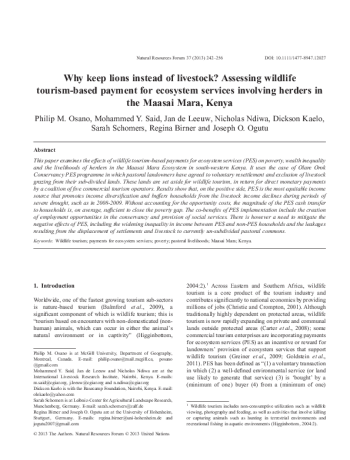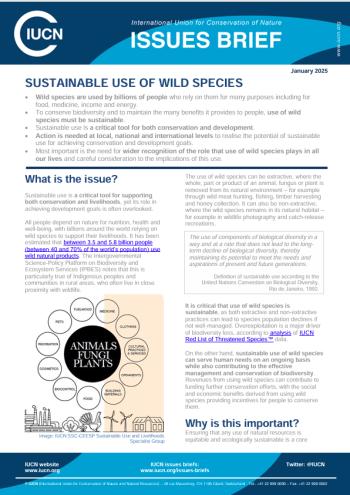
Why keep lions instead of livestock? Assessing wildlife tourism-based payment for ecosystem services involving herders in the Maasai Mara, Kenya
Why keep lions instead of livestock? Assessing wildlife tourism-based payment for ecosystem services involving herders in the Maasai Mara, Kenya
This paper examines the effects of wildlife tourism-based payments for ecosystem services (PES) on poverty, wealth inequality and the livelihoods of herders in the Maasai Mara Ecosystem in south-western Kenya. It uses the case of Olare Orok Conservancy PES programme in which pastoral landowners have agreed to voluntary resettlement and exclusion of livestock grazing from their sub-divided lands. These lands are set aside for wildlife tourism, in return for direct monetary payments by a coalition of five commercial tourism operators.
Osano, P.M., Said, M.Y., de Leeuw, J., Ndiwa, N., Kaelo, D., Schomers, S., Birner, R. and Ogutu, J.O. (2013), Why keep lions instead of livestock? Assessing wildlife tourism-based payment for ecosystem services involving herders in the Maasai Mara, Kenya. Philip M . O sano et al.. Nat Resour Forum, 37: 242-256. doi:10.1111/1477-8947.12027.
-
Philip Osano et al
We support the free flow of information. Please share:
Form coming soon
Related Content
-

-

Review of African Social and Economic Development Volume 1
ByIbrahim Bàbátúndé Anobaarrow_forward2024 -

Economic Analysis: Climate Change and Wildlife Utilization on Private Land
ByJackson OtienoEdwin Muchapondwaarrow_forward2015
Get updates by email
Through impactful research, stakeholder engagement, and professional development, AWEI is supporting the wildlife economy across Africa. Please subscribe for occasional updates on our work and forthcoming events.
Sign up for a quarterly dose of AWEI insights
In a complex and changing world, AWEI generates strategic ideas, conducts independent analysis on wildlife economies, and collaborates with global scholar-practitioners to provide training and expertise for biodiversity conservation, climate resilience, and inclusive economic opportunities in Africa.
